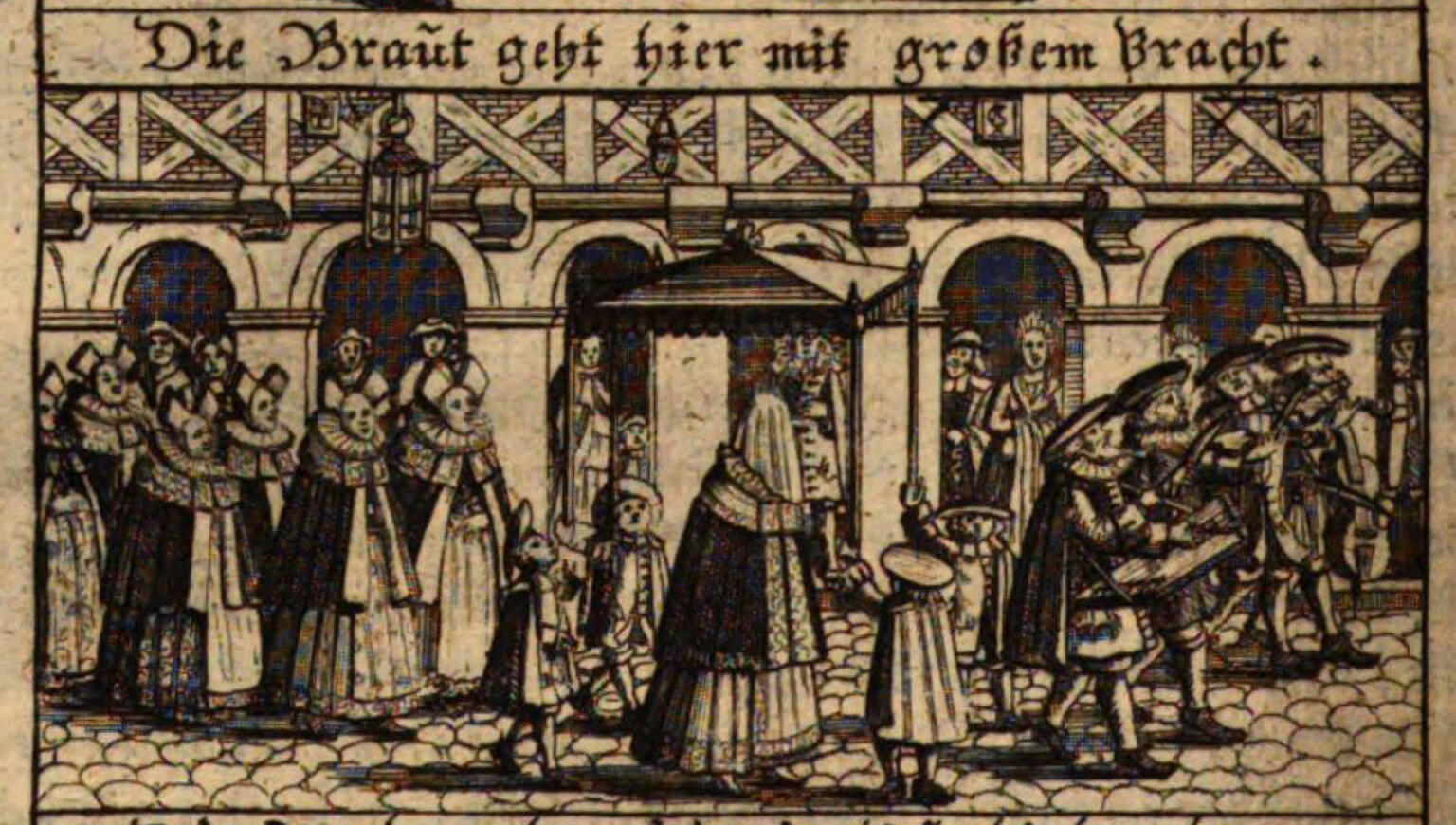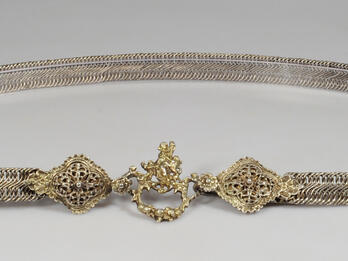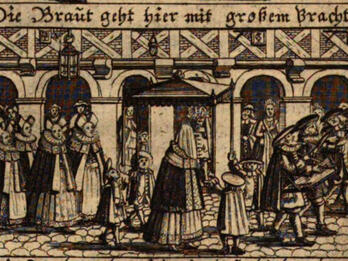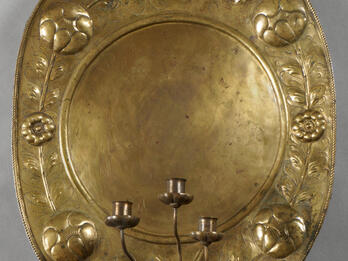Decree: On Bridal Processions
Text endorsing regulations concerning the playing of instrumental music and other entertainments, and the night-time bridal procession, drafted by me with the powerful endorsement of the sages—may the All-Merciful preserve and redeem them—which was publicly proclaimed in the year 5314, to operate for ten years.
For three things does our beautiful, glorious land tremble. This city, which is described in Lamentations as the assembly, the praise, the perfection of beauty (Lamentations 2:15) of the delight of our majestic community, for all the women sally forth [see Exodus 15:20] with silver and golden jewelry onto the streets and marketplaces, with chains around their necks and ornaments of various kinds [see Esther 1:7]. Our enemies gaze on, vainly yearning to annihilate, extirpate, and swallow the holy ones [see Numbers 4:20]. Both their hatred and their envy [see Ecclesiastes 9:6] are constantly directed against us. We have witnessed a yet greater evil. When the bride enters beneath the marital canopy, we become a reproach to our neighbors, a scorn and a derision to the surrounding myriads of holiness [see Psalms 79:4]. For the chaste daughters of Israel walk along mincingly [see Isaiah 3:16], so that darkness is like light [see Psalms 139:12]. When such things as these befall them [see Leviticus 10:19], they issue a proclamation throughout the entire camp [see Exodus 36:6] of the Hebrews [ha-‘ivrim]: “Let the blind [ha-‘iverim] behold the joyous conversation of every mouth uttering obscenities most raucously”—and thus the Name of Heaven is defiled!
Moreover, precipitating cursing, discomfiture, and rebuke [see Deuteronomy 28:20]—a song of mishaps; we have been seized by the sound of songs [shirim] instead of birth-pangs [tsirim], on account of the hurt suffered by our nation [see Jeremiah 8:21] which is like a rose among the thorns (Song of Songs 2:2). For little foxes destroy the vineyard [see Song of Songs 2:15] of the Lord of the hosts of the House of Israel with harps and psalteries, and none of them becomes sick with our ailment.
Wherefore we, the youngest of the flock [see Jeremiah 49:20] in this our land, in this city of praise to our God, have risen and stand upright [see Psalms 20:9] to straighten that which they have made crooked. The harmful nature of this universal mode of conduct has rendered it easier for us to reach agreement and we are united in our endorsement of a single viewpoint—to affirm with full force, with all the stringencies, both of the lighter and the more stringent variety, three listed, undersigned points of agreement, in this, our scroll of truth, for a period of ten consecutive years.
First, we agreed that no one may, under any circumstances, lead a bride from her home to that of her husband by night, at the time of her entry under the marital canopy, either at the beginning of the night or at the morning watch, as was their prior custom, as this can have terrible results. Rather, she should be treated in the manner of chaste girls [see Exodus 21:9], in that the womenfolk alone shall lead her by day, without candles being lit. Secondly, we agreed that no male musician who plays a harp and a flute (Genesis 4:21) or any musical instrument shall play or sing during the days of rejoicing—either at the nuptial celebrations of bridegroom and bride or at a circumcision feast, a betrothal or an engagement, either inside or outside the house—though should they wish to bring along dancing-women playing timbrels [see Exodus 15:20], they are free to do so. The men, however, may not play under any circumstances, for music within a house leads to destruction of the threshold [see b. Sotah 48a], except at the time especially designated for rejoicing—for then, permission is granted to householders, that every man should rule in his own house (Esther 1:22). Thirdly, we agreed that all women, upon attaining puberty, and all married women in general, may not carry out, on their persons, from the doors of their homes to the marketplaces and thoroughfares, any silver or gold jewelry, earrings, chains, precious stones, or pearls, or any type of ornament, save for one ring on their hands. Anything additional may be worn by a woman within her home to her heart’s desire, so long as they remain within the house.
All this we agreed to observe and perform, so as permanently to ensure the tranquility and delight of the members of our nation, and we proclaimed it throughout all our communities, all of whom together affirmed and accepted on our behalf all the words of this missive [see Esther 9:26–27]. And we, the undersigned, in mutual agreement, undertook to apply the penalty of naḥash [bans, excommunication, and ostracism], besides all the stringencies accepted by the entire holy community—may their Rock protect them—that if anyone defies our order by transgressing any of the agreed matters aforesaid, we shall pursue him until he repents. We shall neither involve ourselves in his celebrations, nor enter his home or share his company at the time of his celebration until he wholeheartedly repents.
May this precipitate peace among us, and prosperity within our palaces [see Psalms 122:7], and may the Redeeming Angel come to save Israel. This was signed on Tuesday, the 17th of Nisan, in the year 5314 from the Creation [1554], here in Salonika—and it is valid. And we accepted all the stringencies upon ourselves by an undertaking that is fit to endure, not merely in writing—and it is valid.
Samuel Taitatsak, Abraham Sirillo, Moses Ibn Ya‘ish, Samuel de Modena; Benjamin ben R. Meir the Levite, may he be remembered for the afterlife; Moses Almosnino, Solomon of the house of Ḥazzan; Jacob ben R. Samuel, may his soul rest in paradise, Samut, Isaac ben R. Samuel Adarbi; Daniel ben R. Peraḥiah ha-Kohen, may he be remembered for the afterlife.
Credits
The Jewish Community of Salonika, “On Bridal Processions” (decree, Salonika, 17th of Nisan, 5314 [1654]). Published in: Abraham Danon, “La Communauté Juive de Salonique au XVIe siècle (fin),” Revue des Études Juives, vol. 41, no. 82 (1900): pp. 250–65 (253–255).
Published in: The Posen Library of Jewish Culture and Civilization, vol. 5.







